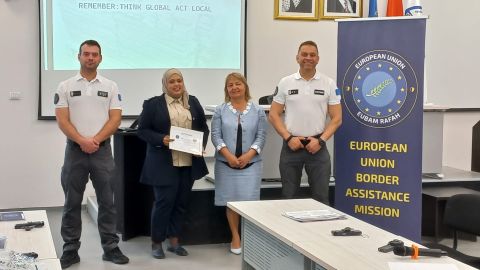
As the first training of its kind and part of its ongoing commitment to supporting the Palestinian Authority in enhancing border security, the EU Border Assistance Mission at the Rafah Crossing Point (EUBAM Rafah) concluded a new joint initiative with the National Customs Agency of Bulgaria to provide specialised training in narcotics detection to the personnel of the Palestinian General Authority for Borders and Crossings (GABC).
“This program marks a significant step forward in strengthening the GABC’s operational capacity in the fight against illicit drug trafficking — a priority concern for border authorities and a major threat to public health and regional stability,” said Dimitrinka Samardzhieva, EUBAM Rafah Border Customs Expert and organiser of the training. “Hence, the training reinforced the EU’s commitment to supporting Palestinian institutions in line with international norms.”
Narcotics smuggling remains a global crime with serious local impact, a major source of revenue for organised crime groups involved in firearms trafficking, modern slavery, and money laundry. Combating the drug smuggling is one of the top priorities for GABC.
EUBAM Rafah has facilitated this timely collaboration with the National Customs Agency of Bulgaria — an institution with proven expertise in border control and narcotics detection within the European Union framework.
The mission works hand-in-hand with the Palestinian GABC, an umbrella body under the Ministry of Interior for eight border control agencies, including the Customs Authority and Border Police. This initiative is fully aligned with EUBAM Rafah’s mandate to support the Palestinian Authority in building professional, accountable, and internationally compliant border management structures.
The narcotics training took place at the GABC Training Center in Jericho, where two experienced trainers from the Bulgarian Customs Agency led a comprehensive training course for 15 GABC personnel. It covered the different categories of narcotics and hazardous substances, the detection techniques at land borders and concealment methods used by traffickers as well as the International legal frameworks and cooperation mechanisms.
For the two trainers from the Department for Combating Narcotics Trafficking at the Central Customs Directorate of the National Customs Agency of Bulgaria, it was important to remind the participants “To think globally, act locally. Today, we must understand global trends in narcotics smuggling and consider how to effectively counter them in our own countries.”
The trainers also emphasized that “the exchange of information and working methods between customs authorities in different countries is a significant advantage in the fight against organized crime, which is destroying both the health of our people and the economic well-being of our societies.”
Part of the training will be also a three-day working visit to Sofia scheduled from 23 to 25 June, with a delegation of five GABC representatives. This activity not only serves to equip GABC with essential skills but also fosters deeper institutional collaboration between Palestinian authorities and European counterparts.